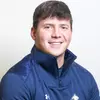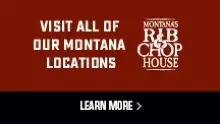
Ryan Davis
Photo by: Adrian Sanchez-Gonzalez
'WE ARE ALL WARRIORS': Bobcat Student-Athletes Celebrate American Indian Heritage Day
9/24/2021 4:00:00 PM | Football
Four Montana State students share their pride in representing both their school and their culture
Among the 300-plus student-athletes that compete for the Bobcats and study at Montana State University, four took a moment this week to reflect on their journey and their culture as Native Americans to celebrate American Indian Heritage Day on September 24. The University set aside September 23-24 for programming and events related to American Indian Heritage Day.
RYAN DAVIS, Tight End, Bobcat Football – Billings, Montana
Ryan Davis followed the footsteps of his father Doug and brothers Leo and Matt into the Bobcat football program. Another brother, Steven, played hoops at Montana State. He grew up in Billings, but traces his roots to the Lower Brule Sioux Reservation in South Dakota and to the Blackfeet Reservation in Montana. Ryan is MSU's starting tight end, and graduates this December in mechanical engineering technology.
"My Grandpa played football in college, my dad had the opportunity to play, but watching my older brothers play is what really inspired me to play. As long as I can remember I was watching Leo play, and I remember (being in Bobcat Stadium) before the Sonny Holland end (was constructed). Larry Thompson was my mom's dad, he played at the University of South Dakota. He got drafted (into the U.S. Army) part way through his career, but we have a letter from Don Shula asking him to come try out for the Baltimore Colts. He was from Reliance, South Dakota, and my mom went to high school in Chamberlain, South Dakota and grew up on the Lower Brule Sioux Reservation, just north of Chamberlain.
"I grew up in Billings, but where my roots and my heritage come from is how I explain (where I'm from). Thanks to my parents, I've had the blessing of a good upbringing and getting the opportunity to be exposed to all walks of life. I lived the "Urban Indian Life" and still have kept those cultural ties. Just because I didn't grow up on the reservation doesn't make me better or worse than anyone who has. I think that cultural pride and knowledge should run deep no matter where you grew up.
"Adjusting to college life, I didn't have trouble adjusting (to college life). I got pointers from three older brothers and my parents. The big joke with my parents is, 'A lot has changed since the '80s,' but I think realistically not much has. The thing that gets you through college are hard work and your dedication to what you do and what you believe in and not losing your goals. But I wouldn't say I had any trouble at all adjusting to college.
"Growing up we went to ceremonies in Browning a lot. We were raised culturally through the Blackfeet ways. I know some things about my Lakota culture from South Dakota, that's where I'm enrolled, actually, but we grew up going to Browning for ceremonies. My (paternal) great, great grandmother, her name was Mary Ground, she always said that it doesn't matter how much blood you've got (from a certain tribe), it's all about what you know about your ceremonies, where you come from, not what your ethnicity is on paper. It's where you come from and how much you know about where you come from. I understand things from my Lakota culture but I never went to any ceremonies there. I was raised in the Blackfeet culture and I grew up going to those ancient ceremonies and those ceremonies haven't changed since they started. It's all the same, the same bundles and the same pipes, it's a holy thing. We sing the same songs as 300 years ago.
"I have sacred cultural items like my prayer box, you smudge and cleanse yourself, I say a Blackfeet prayer before every game, things like that. The first buffalo I ever shot, I still have that robe here, little pieces like that to remind me of home. That's a support (system) in itself. When my dad's around before dinner we'll say the Catholic (prayer of Grace) and after that he'll pray in Blackfeet or my older brothers will pray in Blackfeet, there's always things that are a constant reminder. From the outside looking in, I don't have dark skin or braids, the name tag on my locker doesn't say Browning, Montana, doesn't say Lower Brule, South Dakota, but deep down inside that's something I claim, that's where I come from, that's my heritage.
"I can't say that I've been through a lot of tough experiences and the tough system that it could be (on a reservation), I'll be the first to admit that, I'm not somebody to act like I've been through it. There are things you can't change, but instead of saying 'Woe is me' say 'Why not me? Why can't I be great? Why can't I be another Native American athlete that plays Division I football or basketball or cross country? Why can't I be somebody that goes on to get a degree?' There are so many programs out there with Native American scholarships, tutoring at the Native American Center. There are so many resources that people aren't exposed to enough. I've gone and coached camps on the reservation and there are freak athletes. There are kids that can dunk it in seventh or eighth grade, freak athletes, and they just don't know what they have. We need more success stories of athletes and Native Athletes to give inspiration. People don't hear many successful stories about Native Athletes, and that's something that motivates me and motivated my brothers , I guess, to be another successful story. It's going to take a lot more successful stories for the cycle to break. We are all warriors and are resilient people and born fighters and I am lucky enough to go to battle every Saturday and count coup on my opponents. No matter your upbringing, there's always something you can do to better yourself and your situation."
KOLA BAD BEAR, Forward, Montana State Women's Basketball, Billings, Montana
A star athlete at Billings Senior, Kola Bad Bear suffered a knee injury playing volleyball her senior year and missed her final season in basketball. She was a first team all-state choice in volleyball and basketball as a junior, and played in all 31 games for the MSU's 2019-20 Big Sky Championship team. Kola majors in community health.
"My dad actually brought me into basketball. I have two older sisters who also played, so I followed in their footsteps.
"When people ask I say I'm from Billings because that's what the profiles say, but when they ask where I grew up I tell them Pryor, a small little reservation right below the mountains. I describe it as a place where everyone knows everyone, a small community, small population. I tell people about the corner store, too, how you have to order food through the window because it's not a walk-in, it's part of someone's house.
"It was a little tough adjusting to college my freshman year, the changing climate, the speed of having to keep up with school and sports, being away from family. Even though it's only two hours away it's still a ways for me. I feel like I'm still learning to adjust, but I've gotten a lot better at it. My family's really big and I feel I've adjusted to being away by (considering) my teammates as a family in that way. I consider them my sisters.
"(Kola and her family) talk if not every day every other day, they come to all of my basketball games, scrimmages or whatever, so we stay in touch a lot.
"I see where I come from different (since leaving for college) in a good way. It's humbled me coming from a smaller town to a fast-growing place like Bozeman. Knowing that I have family and people back home is a good feeling.
"I tell kids to keep pursuing the dream, to keep chasing it. I let them know there's going to be doubts and difficulties in their paths, but knowing they can still get through it no matter what, and their family is still with them whether they're living in the same house or are hours away. I describe being at MSU as not necessarily life-changing but as a place that where I've matured and grown up. I still feel like a kid, I'm still learning, but getting to live on my own, how fascinating that is, getting to go to school and play a sport that I love, is having the best of both worlds. Even though it's busy and tough, it's a nice lifestyle and it's all worth it."
HUNTER BEAR CLOUD, Jumper, Montana State Track and Field, Hardin, Montana
A freshman in MSU's elite Nursing program, Hunter Bear Cloud grew up on the Crow Reservation and attended Hardin High School. He was a standout track athlete there, and winning the Class A 200 meters championship last spring.
"I'm enrolled in the Crow Tribe, and that's over by Hardin. I grew up on the reservation about six miles outside of Hardin. I grew up playing baseball and football, you know just trying out sports and being a little kid. I'd say I got into track about my eighth grade year. One of the coaches pulled me into it. At first, track was a sport that never really stood out to me, it was never something I saw myself doing. But as soon as practice started, I began to like it more. Jumping actually came naturally. I was usually a straight-up sprinter, but again, my coaches pulled me aside and kind of threw me into triple jump, and I thought, 'I'm kind of good at this.' So I stuck with it all through high school.
"Yeah, it's a funny look, people look at me, then they look at my last name, and they don't realize I'm Native American because I don't look like it. It's hard to describe (Crow Agency) because it's a lot different from Bozeman, it's a very small, more reserved environment.
"It's actually really nice transitioning into college because the school and Athletics Department are so supportive here. I really enjoy it. Myself, I'm not too traditional with being Native American. My siblings and I go back home occasionally just to be around family and friends.
"Yeah, the Nursing program here is pretty good from the start. Again, There's a lot of support, a lot of opportunity, especially for Native Americans, I'm excited about the new (American Indian Center) opening, all the money and the resources they offer.
"I have a big family, I have three brothers and a sister. My parents are back home as well, every once in a while they check to make sure we're staying on top of our grades, that sort of thing, parent stuff.
"Yeah, my advice to kids back home is to listen to the people in your life, your peers, your parents and your coaches, and don't take that for granted. Those are the people that will help you get to where you need to be."
RAEQUAN BATTLE, Forward, Montana State Men's Basketball, Tulalip, Washington
A four-star recruit coming out of Marysville-Pilchuck High School north of Seattle, RaeQuan Battle joined the Washington Huskies for the 2019-20 and 2020-21 seasons, opening his second season with 10 points and three assists against eventual National Champion Baylor. Battle transferred to Montana State this summer. RaeQuan is enrolled in the Tulalip Tribe.
"I got into basketball through my mom. My grandfather was a sports fanatic, he coached, he played baseball, softball, soccer, whatever he could, and he was an all-star at it, so it kind of ran through my family. My mom was a really good basketball player at the same high school I went, Marysville-Pilchuck, and my grandfather went there when it was Marysville Junior High, a while ago, so that's where I get that basketball aspect.
"I describe Tulalip as a tight-knit community, we're all for each other. It's not like we talk every day, but everybody knows each other when gatherings come around, if you go to a Native basketball tournament you will see the same people you see at the grocery store. On the opposite side not many people know how we grew up. It was not the best environment but they gave us certain activities down at the youth center, the Boys and Girls Club, that's what I lived off of. It's a tight-knit community just trying to survive."
"I'd say it's about 40 minutes from where I live (to Seattle), and the difference with my reservation is it's right off of I-5. Marysville's on the other side (of the interstate) and it has about the same amount of people as Bozeman, maybe a small amount more, Everett is 10 minutes south and it has 100,000 people, and Seattle has 300,000 or 400,000 people, so it's more of a city vibe on my reservation. My father lives in Seattle, my grandmother from my dad's side lives in Seattle, so it wasn't a big adjustment going from the Rez to U-dub, but living on my own for the first time without my mom or without staying at my coach's house in high school, that was the adjustment I had.
"Bozeman has been a big-time change. I'm an adventurous dude, I like to take drives and check out some stuff, and here you can drive for a while. In Seattle I have a lot of other things to do, people to see, friends to see that are widespread down I-5 or even further, but here it's just basketball and school, and everybody's here for basketball or whatever sport you play, and school, or if you're a civilian here, just school. You'll see each other and it's pretty cool. The thing that's different is that Seattle's so bit you don't always see those U-dub fans. You sometimes see a Wazzu fan occasionally, but here I see Bobcat fans everywhere. 'Oh, you play basketball!' Sometimes I see kids that were here for our camp in the grocery store and they say, 'What's up?' It's pretty cool.
"We're a Christian family on both sides of my family, by grandparents on both sides of my family are hard-core, they're in the Bible all the time trying to feed me the Word whenever they can. Recently my grandmother passed from Covid in 2020, in March. When I got taken away from my mom when I was a kid I lived with her, she was very Christian, so I pray. I pray whenever I get lonely, I think of her, I think of my family, my grandparents, I call my grandfather to make sure he's good.
"Losing people around my age was probably worse. For example, in 2013 my cousin, who lived with us for most of my life, I called her my sister, she committed suicide. That killed me. She was one of my biggest supporters, she has a daughter that calls me her uncle. I've got cousins, Dante committed suicide, Robbie got in a car wreck, passed away at 20, one of my closest, best friends, his older brother, he was like my older brother, too, he was from the Tulalip Tribes (and died in a school shooting at Marysville-Pilchuck High School). It was stuff I didn't think would happen, it was a big change, losing (friends) to a homicide. And it wasn't just him. Shaylene Chuckulnaskit, she was a cousin of mine, Andrew Fryberg, he lost his life that day, too. Nate Hatch, he survived but he's going through it. I think about all of them, all the time, and I give my respects (to two other victims). I was in eighth grade (when the shooting happened). Me and Julian, one of my best friends of my childhood, all of a sudden I see him taken out of the classroom by our principal, and he starts breaking down, and I got a phone call from my mom and she said, 'Do not go to M-P,' we were going there for basketball, an open gym they had going on. All of that motivates me because he was an athlete, all of them were athletes, they had dreams of being a wrestler or they loved football, stuff like that. My passion is basketball so I want to push that forward and make it for them, not just for myself but make it for them, my sister, my grandmother, my cousins, whoever went to soon.
"(My family) talk about me a lot, I feel like, especially my mom. She's a proud mother. All of my brothers are doing their thing, focusing on their stuff, taking steps in their lives. They're all proud of me. 'I just picked up this MSU gear in this one shop.' I was (home) for four days this fall, and it (felt) like I'm getting older. At U-dub I was not that far away, I could drive home literally whenever I wanted. Here, I'm in a different state, a different culture, different aspect, different way of life for some people. A college town is way different from a commuter school in a big city. I think it's amazing for me to come here and learn how to isolate myself from people and work on my own game and really focus on myself instead of being (close to) home. When I think of home, that's always going to be there, that's how I think of it. Now, I just have to focus on myself, make my money, make my dreams come true.
"First off, my advice (to young people) is to stay in school. They will not look at you if you do not (do well in) school. On the record I only had two offers, but the (amount) of calls weren't matched up to my offers. I probably had interest from 15 schools that I like, like Oklahoma. They didn't offer me, when they looked at my schoolwork, whatever I had, (the said), 'Can't, sorry.' So I say stay in school, be respectful, because if you're not respectful you're attitude's not going to be good. I know a couple people who are great attitudes but (have) bad attitudes, didn't make it. Or they made it to college and they keep going to different colleges. I love them to death, but that's mistakes I don't want to make. Last but not least, be happy with what you're doing. If you're not happy, don't do it.
"If you've been to Marysville, it's very similar (to Bozeman). It's a little more diverse, but everybody stays in that little area. Here you have to get used to the open space. Big Sky is called Big Sky for a reason. You can't look for miles at home, but here you can look for miles, so I say the scenery (in Bozeman) is beautiful, the wildlife is beautiful. And I really love the coaches (at MSU). They push me, they see something in me, they want me to be a great player and they really show it. They don't make me feel like I'm (being ignored), they want me to graduate, they want me to be a professional, and I have a lot of love for them."
RYAN DAVIS, Tight End, Bobcat Football – Billings, Montana
Ryan Davis followed the footsteps of his father Doug and brothers Leo and Matt into the Bobcat football program. Another brother, Steven, played hoops at Montana State. He grew up in Billings, but traces his roots to the Lower Brule Sioux Reservation in South Dakota and to the Blackfeet Reservation in Montana. Ryan is MSU's starting tight end, and graduates this December in mechanical engineering technology.
"My Grandpa played football in college, my dad had the opportunity to play, but watching my older brothers play is what really inspired me to play. As long as I can remember I was watching Leo play, and I remember (being in Bobcat Stadium) before the Sonny Holland end (was constructed). Larry Thompson was my mom's dad, he played at the University of South Dakota. He got drafted (into the U.S. Army) part way through his career, but we have a letter from Don Shula asking him to come try out for the Baltimore Colts. He was from Reliance, South Dakota, and my mom went to high school in Chamberlain, South Dakota and grew up on the Lower Brule Sioux Reservation, just north of Chamberlain.
"I grew up in Billings, but where my roots and my heritage come from is how I explain (where I'm from). Thanks to my parents, I've had the blessing of a good upbringing and getting the opportunity to be exposed to all walks of life. I lived the "Urban Indian Life" and still have kept those cultural ties. Just because I didn't grow up on the reservation doesn't make me better or worse than anyone who has. I think that cultural pride and knowledge should run deep no matter where you grew up.
"Adjusting to college life, I didn't have trouble adjusting (to college life). I got pointers from three older brothers and my parents. The big joke with my parents is, 'A lot has changed since the '80s,' but I think realistically not much has. The thing that gets you through college are hard work and your dedication to what you do and what you believe in and not losing your goals. But I wouldn't say I had any trouble at all adjusting to college.
"Growing up we went to ceremonies in Browning a lot. We were raised culturally through the Blackfeet ways. I know some things about my Lakota culture from South Dakota, that's where I'm enrolled, actually, but we grew up going to Browning for ceremonies. My (paternal) great, great grandmother, her name was Mary Ground, she always said that it doesn't matter how much blood you've got (from a certain tribe), it's all about what you know about your ceremonies, where you come from, not what your ethnicity is on paper. It's where you come from and how much you know about where you come from. I understand things from my Lakota culture but I never went to any ceremonies there. I was raised in the Blackfeet culture and I grew up going to those ancient ceremonies and those ceremonies haven't changed since they started. It's all the same, the same bundles and the same pipes, it's a holy thing. We sing the same songs as 300 years ago.
"I have sacred cultural items like my prayer box, you smudge and cleanse yourself, I say a Blackfeet prayer before every game, things like that. The first buffalo I ever shot, I still have that robe here, little pieces like that to remind me of home. That's a support (system) in itself. When my dad's around before dinner we'll say the Catholic (prayer of Grace) and after that he'll pray in Blackfeet or my older brothers will pray in Blackfeet, there's always things that are a constant reminder. From the outside looking in, I don't have dark skin or braids, the name tag on my locker doesn't say Browning, Montana, doesn't say Lower Brule, South Dakota, but deep down inside that's something I claim, that's where I come from, that's my heritage.
"I can't say that I've been through a lot of tough experiences and the tough system that it could be (on a reservation), I'll be the first to admit that, I'm not somebody to act like I've been through it. There are things you can't change, but instead of saying 'Woe is me' say 'Why not me? Why can't I be great? Why can't I be another Native American athlete that plays Division I football or basketball or cross country? Why can't I be somebody that goes on to get a degree?' There are so many programs out there with Native American scholarships, tutoring at the Native American Center. There are so many resources that people aren't exposed to enough. I've gone and coached camps on the reservation and there are freak athletes. There are kids that can dunk it in seventh or eighth grade, freak athletes, and they just don't know what they have. We need more success stories of athletes and Native Athletes to give inspiration. People don't hear many successful stories about Native Athletes, and that's something that motivates me and motivated my brothers , I guess, to be another successful story. It's going to take a lot more successful stories for the cycle to break. We are all warriors and are resilient people and born fighters and I am lucky enough to go to battle every Saturday and count coup on my opponents. No matter your upbringing, there's always something you can do to better yourself and your situation."
KOLA BAD BEAR, Forward, Montana State Women's Basketball, Billings, Montana
A star athlete at Billings Senior, Kola Bad Bear suffered a knee injury playing volleyball her senior year and missed her final season in basketball. She was a first team all-state choice in volleyball and basketball as a junior, and played in all 31 games for the MSU's 2019-20 Big Sky Championship team. Kola majors in community health.
"My dad actually brought me into basketball. I have two older sisters who also played, so I followed in their footsteps.
"When people ask I say I'm from Billings because that's what the profiles say, but when they ask where I grew up I tell them Pryor, a small little reservation right below the mountains. I describe it as a place where everyone knows everyone, a small community, small population. I tell people about the corner store, too, how you have to order food through the window because it's not a walk-in, it's part of someone's house.
"It was a little tough adjusting to college my freshman year, the changing climate, the speed of having to keep up with school and sports, being away from family. Even though it's only two hours away it's still a ways for me. I feel like I'm still learning to adjust, but I've gotten a lot better at it. My family's really big and I feel I've adjusted to being away by (considering) my teammates as a family in that way. I consider them my sisters.
"(Kola and her family) talk if not every day every other day, they come to all of my basketball games, scrimmages or whatever, so we stay in touch a lot.
"I see where I come from different (since leaving for college) in a good way. It's humbled me coming from a smaller town to a fast-growing place like Bozeman. Knowing that I have family and people back home is a good feeling.
"I tell kids to keep pursuing the dream, to keep chasing it. I let them know there's going to be doubts and difficulties in their paths, but knowing they can still get through it no matter what, and their family is still with them whether they're living in the same house or are hours away. I describe being at MSU as not necessarily life-changing but as a place that where I've matured and grown up. I still feel like a kid, I'm still learning, but getting to live on my own, how fascinating that is, getting to go to school and play a sport that I love, is having the best of both worlds. Even though it's busy and tough, it's a nice lifestyle and it's all worth it."
HUNTER BEAR CLOUD, Jumper, Montana State Track and Field, Hardin, Montana
A freshman in MSU's elite Nursing program, Hunter Bear Cloud grew up on the Crow Reservation and attended Hardin High School. He was a standout track athlete there, and winning the Class A 200 meters championship last spring.
"I'm enrolled in the Crow Tribe, and that's over by Hardin. I grew up on the reservation about six miles outside of Hardin. I grew up playing baseball and football, you know just trying out sports and being a little kid. I'd say I got into track about my eighth grade year. One of the coaches pulled me into it. At first, track was a sport that never really stood out to me, it was never something I saw myself doing. But as soon as practice started, I began to like it more. Jumping actually came naturally. I was usually a straight-up sprinter, but again, my coaches pulled me aside and kind of threw me into triple jump, and I thought, 'I'm kind of good at this.' So I stuck with it all through high school.
"Yeah, it's a funny look, people look at me, then they look at my last name, and they don't realize I'm Native American because I don't look like it. It's hard to describe (Crow Agency) because it's a lot different from Bozeman, it's a very small, more reserved environment.
"It's actually really nice transitioning into college because the school and Athletics Department are so supportive here. I really enjoy it. Myself, I'm not too traditional with being Native American. My siblings and I go back home occasionally just to be around family and friends.
"Yeah, the Nursing program here is pretty good from the start. Again, There's a lot of support, a lot of opportunity, especially for Native Americans, I'm excited about the new (American Indian Center) opening, all the money and the resources they offer.
"I have a big family, I have three brothers and a sister. My parents are back home as well, every once in a while they check to make sure we're staying on top of our grades, that sort of thing, parent stuff.
"Yeah, my advice to kids back home is to listen to the people in your life, your peers, your parents and your coaches, and don't take that for granted. Those are the people that will help you get to where you need to be."
RAEQUAN BATTLE, Forward, Montana State Men's Basketball, Tulalip, Washington
A four-star recruit coming out of Marysville-Pilchuck High School north of Seattle, RaeQuan Battle joined the Washington Huskies for the 2019-20 and 2020-21 seasons, opening his second season with 10 points and three assists against eventual National Champion Baylor. Battle transferred to Montana State this summer. RaeQuan is enrolled in the Tulalip Tribe.
"I got into basketball through my mom. My grandfather was a sports fanatic, he coached, he played baseball, softball, soccer, whatever he could, and he was an all-star at it, so it kind of ran through my family. My mom was a really good basketball player at the same high school I went, Marysville-Pilchuck, and my grandfather went there when it was Marysville Junior High, a while ago, so that's where I get that basketball aspect.
"I describe Tulalip as a tight-knit community, we're all for each other. It's not like we talk every day, but everybody knows each other when gatherings come around, if you go to a Native basketball tournament you will see the same people you see at the grocery store. On the opposite side not many people know how we grew up. It was not the best environment but they gave us certain activities down at the youth center, the Boys and Girls Club, that's what I lived off of. It's a tight-knit community just trying to survive."
"I'd say it's about 40 minutes from where I live (to Seattle), and the difference with my reservation is it's right off of I-5. Marysville's on the other side (of the interstate) and it has about the same amount of people as Bozeman, maybe a small amount more, Everett is 10 minutes south and it has 100,000 people, and Seattle has 300,000 or 400,000 people, so it's more of a city vibe on my reservation. My father lives in Seattle, my grandmother from my dad's side lives in Seattle, so it wasn't a big adjustment going from the Rez to U-dub, but living on my own for the first time without my mom or without staying at my coach's house in high school, that was the adjustment I had.
"Bozeman has been a big-time change. I'm an adventurous dude, I like to take drives and check out some stuff, and here you can drive for a while. In Seattle I have a lot of other things to do, people to see, friends to see that are widespread down I-5 or even further, but here it's just basketball and school, and everybody's here for basketball or whatever sport you play, and school, or if you're a civilian here, just school. You'll see each other and it's pretty cool. The thing that's different is that Seattle's so bit you don't always see those U-dub fans. You sometimes see a Wazzu fan occasionally, but here I see Bobcat fans everywhere. 'Oh, you play basketball!' Sometimes I see kids that were here for our camp in the grocery store and they say, 'What's up?' It's pretty cool.
"We're a Christian family on both sides of my family, by grandparents on both sides of my family are hard-core, they're in the Bible all the time trying to feed me the Word whenever they can. Recently my grandmother passed from Covid in 2020, in March. When I got taken away from my mom when I was a kid I lived with her, she was very Christian, so I pray. I pray whenever I get lonely, I think of her, I think of my family, my grandparents, I call my grandfather to make sure he's good.
"Losing people around my age was probably worse. For example, in 2013 my cousin, who lived with us for most of my life, I called her my sister, she committed suicide. That killed me. She was one of my biggest supporters, she has a daughter that calls me her uncle. I've got cousins, Dante committed suicide, Robbie got in a car wreck, passed away at 20, one of my closest, best friends, his older brother, he was like my older brother, too, he was from the Tulalip Tribes (and died in a school shooting at Marysville-Pilchuck High School). It was stuff I didn't think would happen, it was a big change, losing (friends) to a homicide. And it wasn't just him. Shaylene Chuckulnaskit, she was a cousin of mine, Andrew Fryberg, he lost his life that day, too. Nate Hatch, he survived but he's going through it. I think about all of them, all the time, and I give my respects (to two other victims). I was in eighth grade (when the shooting happened). Me and Julian, one of my best friends of my childhood, all of a sudden I see him taken out of the classroom by our principal, and he starts breaking down, and I got a phone call from my mom and she said, 'Do not go to M-P,' we were going there for basketball, an open gym they had going on. All of that motivates me because he was an athlete, all of them were athletes, they had dreams of being a wrestler or they loved football, stuff like that. My passion is basketball so I want to push that forward and make it for them, not just for myself but make it for them, my sister, my grandmother, my cousins, whoever went to soon.
"(My family) talk about me a lot, I feel like, especially my mom. She's a proud mother. All of my brothers are doing their thing, focusing on their stuff, taking steps in their lives. They're all proud of me. 'I just picked up this MSU gear in this one shop.' I was (home) for four days this fall, and it (felt) like I'm getting older. At U-dub I was not that far away, I could drive home literally whenever I wanted. Here, I'm in a different state, a different culture, different aspect, different way of life for some people. A college town is way different from a commuter school in a big city. I think it's amazing for me to come here and learn how to isolate myself from people and work on my own game and really focus on myself instead of being (close to) home. When I think of home, that's always going to be there, that's how I think of it. Now, I just have to focus on myself, make my money, make my dreams come true.
"First off, my advice (to young people) is to stay in school. They will not look at you if you do not (do well in) school. On the record I only had two offers, but the (amount) of calls weren't matched up to my offers. I probably had interest from 15 schools that I like, like Oklahoma. They didn't offer me, when they looked at my schoolwork, whatever I had, (the said), 'Can't, sorry.' So I say stay in school, be respectful, because if you're not respectful you're attitude's not going to be good. I know a couple people who are great attitudes but (have) bad attitudes, didn't make it. Or they made it to college and they keep going to different colleges. I love them to death, but that's mistakes I don't want to make. Last but not least, be happy with what you're doing. If you're not happy, don't do it.
"If you've been to Marysville, it's very similar (to Bozeman). It's a little more diverse, but everybody stays in that little area. Here you have to get used to the open space. Big Sky is called Big Sky for a reason. You can't look for miles at home, but here you can look for miles, so I say the scenery (in Bozeman) is beautiful, the wildlife is beautiful. And I really love the coaches (at MSU). They push me, they see something in me, they want me to be a great player and they really show it. They don't make me feel like I'm (being ignored), they want me to graduate, they want me to be a professional, and I have a lot of love for them."
Players Mentioned
Leon Costello Press Conference: Kennedy-Stark Athletic Center
Thursday, July 31
A Conversation with President Dr. Waded Cruzado | Montana State Athletics
Monday, May 19
Big Cats, Little Trucks - Willie Patterson
Wednesday, May 03
Matt Houk Introductory Press Conference
Wednesday, May 03
















